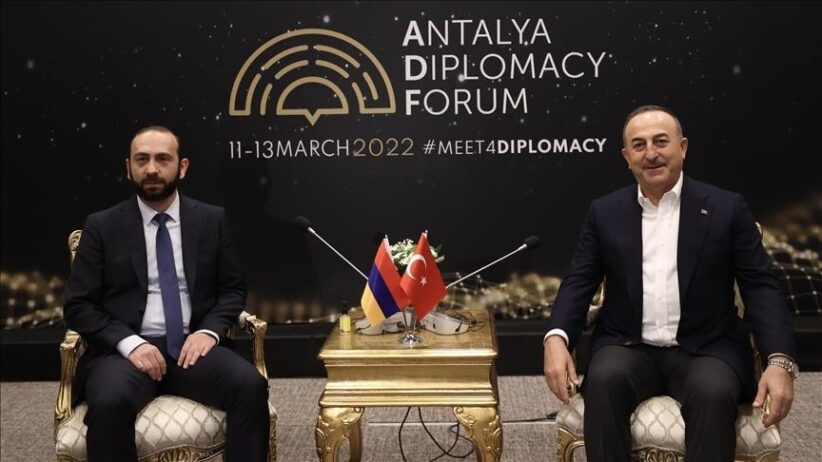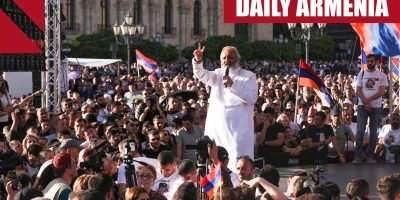By Mark Dovich
Armenia and Turkey have vowed to continue pursuing efforts to normalize their relations “without conditions” after talks on Saturday that Turkish Foreign Minister Mevlüt Çavuşoğlu called “productive and constructive.”
Çavuşoğlu met with his Armenian counterpart, Ararat Mirzoyan, in the Turkish coastal city of Antalya at a Turkish-organized diplomatic forum. The event brought together representatives of 75 countries and nearly 40 international organizations, according to a Foreign Ministry press release.
“During our meeting, we reaffirmed the readiness of both sides to continue the process of normalization, establishing relations, opening borders without any preconditions,” Mirzoyan said following his half-hour talk with Çavuşoğlu.
Azerbaijan also “supports the process” of Armenian-Turkish normalization, Çavuşoğlu added.
Saturday’s meeting was the first face-to-face meeting between the two countries’ foreign ministers since 2009, when Armenian and Turkish representatives met in Zurich to sign a deal that would have established full diplomatic relations.
However, the agreement was never ratified, in large part due to Azerbaijan’s pressure on Turkey and its harsh opposition to the deal’s terms. Armenia formally declared the agreement null and void in 2018.
Relations between Armenia and Turkey have been extremely tense for decades. Though the two neighboring countries officially recognize one another, they have never established diplomatic relations.
Ongoing disputes include Turkey’s refusal to acknowledge the mass killings of Armenians in the Ottoman Empire during World War I as an act of genocide, as well as Turkey’s role aiding Azerbaijan in its 2020 war against Armenia in and around Karabakh.
In addition, the Armenia-Turkey border, which stretches for over 300 kilometers, has been closed since the early 1990s, when Turkey, in coordination with Azerbaijan, imposed an economic blockade on Armenia that remains in place today.
Normalizing relations would entail mutual diplomatic recognition and reopening the two countries’ shared border, which runs along the Armenian regions of Shirak, Aragatsotn, Armavir, and Ararat. There is little detail on how this would work in practice.
The latest round of negotiations began last December, when the Turkish government named Serdar Kılıç, a former ambassador to the United States, as Turkey’s special envoy to Armenia. Days later, Armenia selected Ruben Rubinyan, the deputy speaker of parliament, as its envoy.
Kılıç and Rubinyan have met twice in recent months, in Moscow in January and in Vienna in February.
The past few months have also seen the two sides making announcements aimed at reestablishing some commercial and air ties.
Last December, Armenia’s Economy Ministry confirmed that the government’s ban on Turkish imports would expire on January 1. Economy Minister Vahan Kerobyan told journalists last month that “political motives will be the overriding ones” in the decision to lift the ban.
Armenia first put the ban in place in December 2020, in response to Turkey’s support for Azerbaijan in that year’s war in and around Karabakh. Before the ban, about 5 percent of Armenia’s total imports came from Turkey, mostly clothing.
Then last month, two lost-cost carriers, FlyOne Armenia and Turkey’s Pegasus Airlines, began operating direct flights between Yerevan and Istanbul. No airlines had offered direct routes connecting Armenia and Turkey since 2015.
During his visit to Turkey, Mirzoyan also met with his Russian and Austrian counterparts, Sergey Lavrov and Alexander Schallenberg.
In addition, this year’s Antalya Diplomacy Forum saw Lavrov meet with Ukrainian Foreign Minister Dmytro Kuleba to discuss the possibility of reaching a ceasefire agreement to end the ongoing war in Ukraine. That meeting reportedly ended without progress.
















